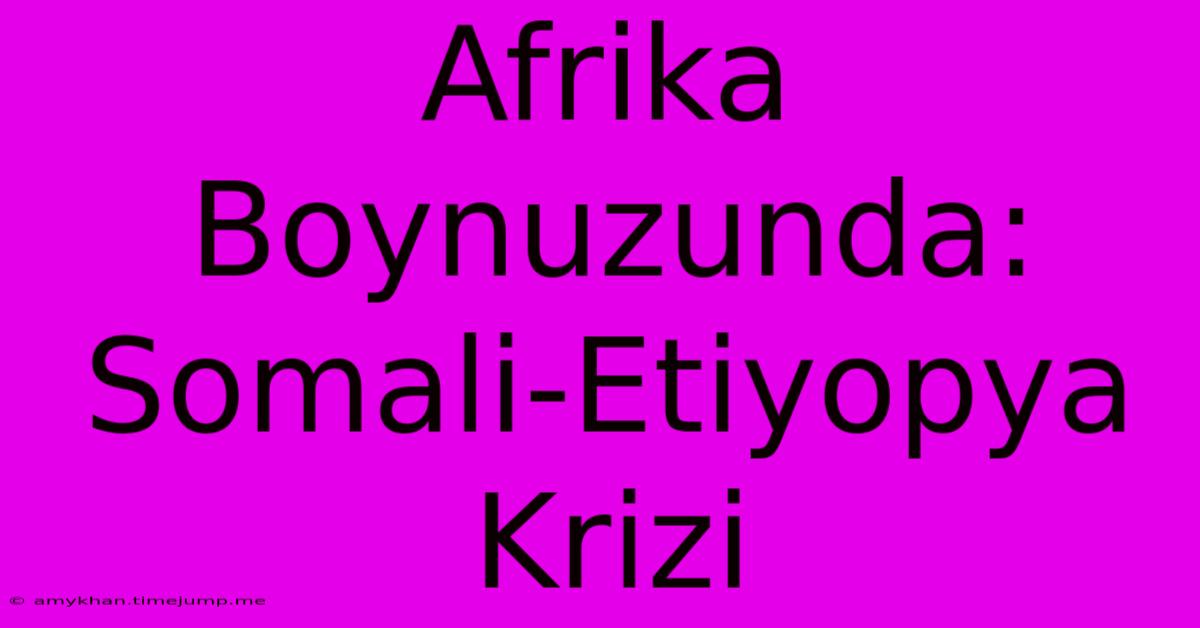Afrika Boynuzunda: Somali-Etiyopya Krizi

Discover more detailed and exciting information on our website. Click the link below to start your adventure: Visit Best Website Slync. Don't miss out!
Table of Contents
Afrika Boynuzunda: Somali-Etiyopya Krizi
The Horn of Africa, a region historically marked by instability, is once again facing heightened tensions. The simmering conflict between Somalia and Ethiopia, though not a full-blown war, presents a significant threat to regional peace and stability. This article delves into the complexities of the Somali-Ethiopian crisis, exploring its historical roots, current manifestations, and potential implications.
Historical Context: A Long and Complex Relationship
The relationship between Somalia and Ethiopia is fraught with a history of conflict, largely stemming from territorial disputes and ethnic tensions. The Ogaden region, a Somali-inhabited area within Ethiopia, has been a major flashpoint. Past conflicts, particularly the Ogaden War of the late 1970s, left deep scars on both nations. These historical grievances continue to fuel mistrust and complicate present-day relations. Understanding this historical baggage is crucial to grasping the current crisis.
The Role of Irredentism
Somali irredentism – the belief that territories inhabited by Somalis should be united under a single Somali state – has played a significant role in exacerbating tensions with Ethiopia. While this ideology isn't the sole cause of the current conflict, it undeniably contributes to the underlying animosity and fuels nationalist sentiments that can easily escalate into violence.
Current Manifestations: Beyond Border Disputes
The current crisis isn't solely defined by border skirmishes. While territorial disagreements persist, the conflict manifests in various ways:
Political Tensions and Diplomatic Standoffs
Diplomatic relations between the two countries remain strained. Accusations of interference in internal affairs and support for opposing factions are common, further escalating the tension. The lack of open communication and dialogue hinders any meaningful progress toward de-escalation.
Economic Implications
The conflict has significant economic consequences for both nations. Trade disruptions, reduced investment, and the diversion of resources to defense efforts negatively impact economic growth and development. The instability also discourages foreign investment, hindering much-needed development in the region.
Humanitarian Concerns
The ongoing instability poses significant humanitarian challenges. Displaced populations, limited access to essential services, and the potential for further violence create a vulnerable environment for civilians. International humanitarian organizations are working to address these challenges, but their efforts are often hampered by the ongoing conflict.
Potential Implications: Regional Instability and Beyond
The Somali-Ethiopian crisis doesn't exist in isolation. Its potential implications extend far beyond the borders of the two countries:
Regional Destabilization
A further escalation of the conflict could destabilize the entire Horn of Africa, potentially drawing in neighboring countries and exacerbating existing regional conflicts. This instability could create a breeding ground for extremism and further complicate efforts towards peace and development.
International Involvement
The international community, particularly the African Union and the United Nations, plays a crucial role in mediating the conflict and preventing further escalation. However, finding a lasting solution requires a nuanced understanding of the historical, political, and economic factors driving the crisis.
The Path Forward: Towards Resolution
Resolving the Somali-Ethiopian crisis requires a multifaceted approach:
-
Dialogue and Diplomacy: Open communication channels and a willingness to negotiate are essential for finding common ground and de-escalating tensions. International mediation efforts can play a crucial role in fostering dialogue.
-
Addressing Historical Grievances: Acknowledging and addressing historical injustices and grievances is vital for building trust and fostering reconciliation. This requires honest dialogue and a commitment to finding mutually acceptable solutions.
-
Economic Cooperation: Promoting regional economic cooperation can foster interdependence and create incentives for peaceful coexistence. Joint infrastructure projects, trade agreements, and investment initiatives can contribute to long-term stability.
-
Strengthening Regional Security Mechanisms: Collaboration among regional security actors is crucial in preventing further escalation and maintaining peace and security.
The Somali-Ethiopian crisis is a complex and challenging issue. However, through sustained diplomacy, regional cooperation, and a commitment to peaceful conflict resolution, there is a path forward towards a more stable and prosperous Horn of Africa. The international community must remain actively engaged in supporting these efforts.

Thank you for visiting our website wich cover about Afrika Boynuzunda: Somali-Etiyopya Krizi. We hope the information provided has been useful to you. Feel free to contact us if you have any questions or need further assistance. See you next time and dont miss to bookmark.
Also read the following articles
| Article Title | Date |
|---|---|
| Guengoeren Bina Coekuesue Kamera Goeruentuelerinde Panik | Dec 12, 2024 |
| Kadir Saglam Galatasaray Trabzonspor Hakemi | Dec 12, 2024 |
| Milan In Yenilmezligi Devam Ediyor | Dec 12, 2024 |
| Milan In Suerprizsiz Zaferi | Dec 12, 2024 |
| Esad In Captagon Tekelinin Sonu | Dec 12, 2024 |
